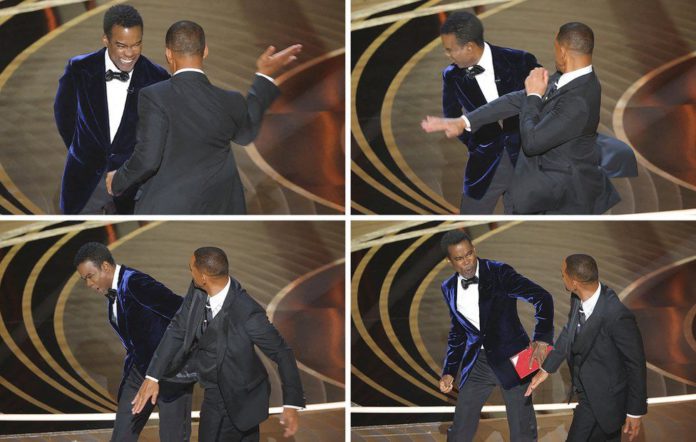“Love will make you do crazy things.” That’s what actor Will Smith said during his Oscars acceptance speech at Sunday’s Academy Awards ceremony.
That shouldn’t include resorting to violence, said Joel Wong, professor and chair of the counseling and educational psychology department at Indiana University Bloomington.
Smith rushed the stage and slapped Chris Rock at the Oscars for making a joke about Smith’s wife, Jada Pinkett Smith, and her closely shaved head. Not long after the incident happened, Smith was back onstage accepting the best actor award and attempted to justify his actions by saying love made him do it and that he was protecting his family. Pinkett Smith suffers from hair loss due to alopecia.
When a man who embodies unhealthy masculine behaviors like violence sees a family member being attacked, he often takes it as a personal affront to his honor, Wong said.
“Family, especially your spouse, is seen as an extension of yourself, so therefore insulting your wife or insulting your children would be viewed equally as threatening as insulting yourself,” Wong said.
For someone with this mindset, the only way to preserve your honor is to react in a way that is public and social, he added. The event needs to be available for viewing so people know his honor was restored.
In Smith’s case, 15.3 million Oscar viewers, along with millions more on the internet saw his response.
Shame may have also played a role, said Wizdom Powell, director of the Health Disparities Institute and associate professor of psychiatry at UConn Health in Farmington, Connecticut.
Smith may have felt shame at originally laughing at the joke before seeing his wife’s displeasure, or vicariously felt her shame, she said.
It’s less socially acceptable for men to be vulnerable, so they may try and regain control in a violent way, Powell explained.
Love as a scapegoat for violence
For domestic abuse survivors, Smith’s rhetoric was all too familiar. When some men act out violently, they claim it’s in the name of true love, according to a study published in the International Journal of Environmental Research and Public Health.
People who engage in bad behavior often have a vague sense that they are conducting themselves in a way that may not be consistent with who they are, Wong said.
They have to find a way to justify what they’ve done and make the decision look righteous, he explained.
“I think it’s important for people to call it what it is and not let Will Smith sort of get away with saying it’s all about love,” Wong said.
Throughout our children’s lives, we teach them that love shouldn’t hurt, Powell said.
“Anytime we equate love with physical violence or aggression, there is a danger that those lines can be blurred,” she said.
Those facing domestic violence have resources available for support from organizations like the National Domestic Violence Hotline.
“Violence is never okay. If anyone impacted by domestic violence was triggered by (Sunday) night’s events at the 94th Academy Awards, The Hotline is here for you 24/7. Learn more at www.thehotline.org,” said Sharon McBride, a representative of NDVH, via email.
How to break the cycle
The “macho” mentality is deeply rooted in our society, so it will take time to unlearn, Wong said.
When a man lashes out with violence, he may think more men approve of his behavior than they actually do, he said.
In reality, most people do not believe that men should be aggressive, according to a 2020 study Wong conducted.
One of the most critical steps to begin the cultural shift is for bystanders to condemn the violent acts, known as positive bystander behavior, he said.
“It’s very important that men say they don’t participate in these kinds of things,” Wong said, because it’s a practical way to undermine unhealthy masculine behavior.
It’s also crucial to distinguish men from unhealthy masculine behaviors because we are not attacking men themselves, Wong said. “We want to celebrate the goodness of men and also express concern when men exhibit behavior that conforms to unhealthy masculine norms.”
Male honor culture and masculine norms are often conditioned in young boys over time, so the solutions need to start there, said Ronald Levant, professor emeritus of psychology at The University of Akron in Ohio.
When men are young boys, they are taught to not cry or show emotion, Levant said. People such as teachers, coaches, and parents and other caregivers need to give careful consideration to the message they are sending boys about masculinity.
“They have to know that it’s not obligatory, that they can be who they are, and that there’s not a set of predetermined personality traits they have to meet,” Levant said.
Boys and girls can be equally emotional, but when boys are told to “walk it off” or “man up,” it chips away at their ability to be vulnerable and show emotions, Powell said.
Grown-ups need to teach young boys how to be vulnerable and use their words in a conflict rather than their fists, she said.
“Those are the kinds of conversations that lead us towards a society where men and women are free to experience a full range of emotions that’s not likely to overcompensate for the lack of access with violence,” Powell said.

